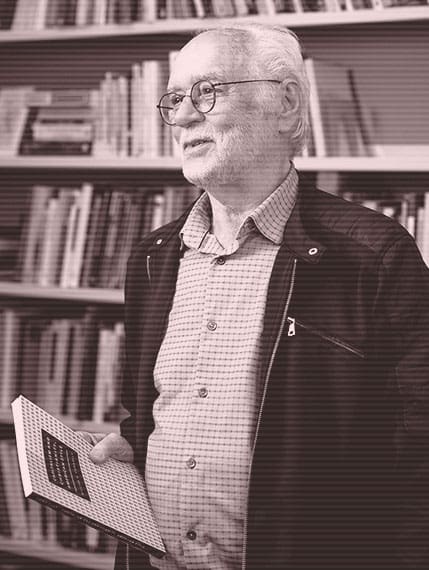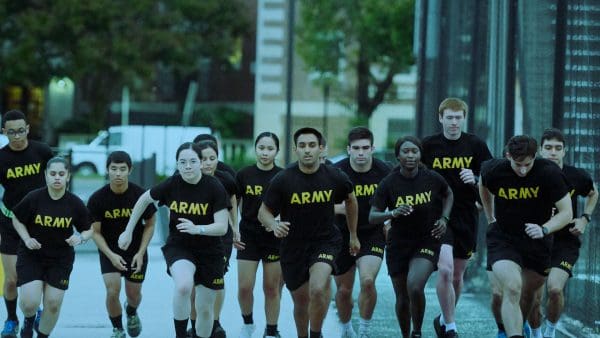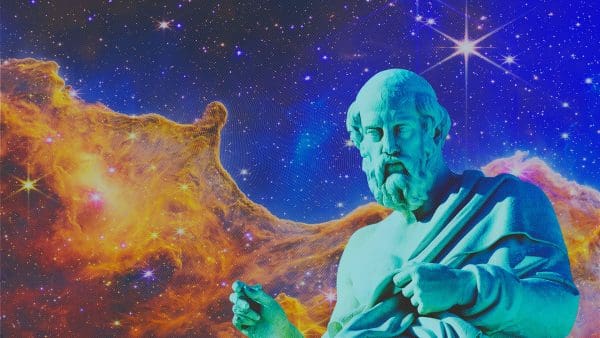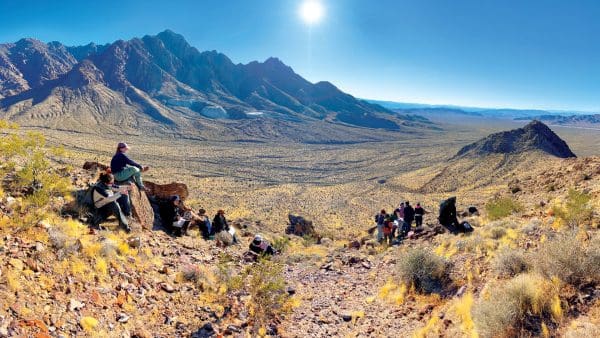
Over the course of his almost-60-year career, William E. Connolly has been a force in the world of political theory, a discipline that explores political and ethical issues. From humble roots through a lifetime of examining the planet’s challenges, the renowned scholar and mentor is almost synonymous with the “Hopkins School,” which he was instrumental in putting on the map as Johns Hopkins’ unique seat to pursue political theory.
On the heels of his January retirement, which followed a two-day symposium held in his honor in November 2023, we sat down with Connolly for a conversation about theory, factory work, blogs, and glaciers—among many other topics—portions of which we share here.
Connolly arrived at the Department of Political Science in 1985. He chaired the department from 1996 to 2003, headed more than 80 dissertation committees, and authored 19 monographs and five decades of journal articles. A 2010 poll of American political theorists ranked him the fourth most influential political theorist in America over the last 20 years, after Rawls, Habermas, and Foucault. He was co-winner of the American Political Science Association’s David Easton Award, was named Distinguished Scholar by the International Studies Association, and was elected to the Fellows AMIAS Board of Trustees of the Institute for Advanced Study. In 2020, the Western Political Science Association created the William E. Connolly Award for Best Paper in Political Theory in his honor. He was named emeritus in January 2024.

What is political theory, and how is it used?
Political theory is a contested realm, with different orientations to theory in competition. It is located in political science departments, and it is precariously balanced between the humanities and the social sciences. Most of us share with the humanities an idea that you don’t give blunt causal explanations of human affairs; you give in-depth interpretations of what’s happening and what the array of possibilities are. That connects us to the humanities, but we often study topics that political scientists do.
It can be an advantage to occupy this precarious position because political theorists often become adventurers as they pursue a problem wherever it takes them. My definition of the intellectual these days is a thinker who pursues the logic of the problem wherever it goes.
If you’re a person like me, who has for 15 years now been almost mesmerized by the questions of what I call “climate wreckage,” because all the other issues I was interested in are also affected by it, then you find yourself balancing between humanities, social sciences, and earth sciences.
My critique of many social scientists, political theorists, and humanists is they’re too socio-centric. They think that the cause of every social process is to be found only somewhere in society itself. It might be, but sometimes it might also be imbricated with melting glaciers, drying aquifers, intensifying wildfires, or an ocean current closing down. And that will carry dramatic consequences for all kinds of social processes.
Most political theorists have traditionally focused on the Great Books in the West. Some seek to capture universal themes, and others seek to set each great theorist in the historical context of the time. Increasingly, theorists are also looking at Indigenous cultures and other things as well. Some study political economy or pluralism.
Now there’s a growing subset of theorists who respect several of those traditions and additionally define themselves the way I want to define myself: We want to do theory ourselves. We’re critical intellectuals who follow the course of a major problem wherever it takes us, often outside the comfort zone of the field within which you have been trained. You have to become amateurish at times. You have to take risks in some domains outside your expertise, and then invite corrections.
If you do that kind of theory, you’re governed by the problem, not by a method, or a list of Great Books, or the prior boundaries of a field.
What brought you to political theory?
I am the son of a factory worker who worked in Flint, Michigan. When he was 34 he was in an accident and fell into a coma, so his life was transformed and mine was too. I went to a commuter college in Flint, and it became clear to me early on that what my teachers said about labor history, and what I knew about it, were often at odds.
I decided that if I were going to go to graduate school, political theory would give me the most room to roam. I wanted to think about the labor process. I also wanted to think about diversity and pluralism in different ways than had so far been widely explored in the social sciences.
How did your background in working-class Flint inform your approach to political theory?
It’s made me bolder than I might have been otherwise. Lying awake at night when I was a little kid wondering how much my dad—who was a labor leader—was going to be targeted by the FBI because of McCarthyism, I think that little boy is still floating around in me, in the way I think about negative possibilities as well as positive ones.
It’s helped me to pursue some possibilities that I might not have, but it also has posed limits. I didn’t start traveling outside of the country, for instance, until I was 39 years old!
The “Hopkins School” has been defined by the problem-oriented approach you describe. What allowed its development?
When I was at the University of Massachusetts, and then at Hopkins, there was ample space for political theory to be done. There were good programs in both places, we attracted really exceptional graduate students, and we placed them well. That gave people room to maneuver in their intellectual work.
When I moved to Hopkins in ’85, there was Dick Flathman in political science, John Pocock in history, George Kelly in what was then the Humanities Center, and Jerry Schneewind in philosophy. I joined the four of them, all relevant to political theory. Dick and I were very different from each other. But both had an exploratory temper and we wanted to look at some new things.
One of the first things we did was to format qualifying exams so that students could focus on a range of thinkers that were relevant to the key problems that they wanted to study, not pretend to cover every theorist in the history of “the West.” That attracted exploratory grad students to our program. And it worked, in terms of the dissertations that were published, job placements, and the awards students won.
At first we didn’t know we were the Hopkins School and then somebody gave it that name, and Dick and I said, yeah, that’s fine.
In 2010, a graduate student told me he wanted me to write a blog. I said I would co-moderate one with him, and we could invite other people and build up a coterie over time. That blog [The Contemporary Condition] became part of the profile of the Hopkins School and lasted for 13 or 14 years. More recently, I’ve written for Common Dreams, which is a blog with a large following.

My critique of many social scientists, political theorists, and humanists is they’re socio-centric. They think that the cause of every social process is to be found only somewhere in society.”
How does the Hopkins School approach show up in your teaching, and what effect has it had there?
Teaching has always been at the center for me. The blogs, the books, the public speeches, the activism all rotate around that. To create the right courses becomes a key to changing your own thinking about key issues. My early interests in capitalism, pluralism, and egalitarianism continue. But today they are all inflected by the accelerating condition of climate wreckage.
If a person’s interest is, say, race or colonialism or immigration, they can’t avoid that topic either, because the various triggers coming from temperate zone capitalist societies—such as methane and CO2 emissions—soon encounter a bunch of planetary amplifiers. They make the cumulative result much bigger than the initial triggers. Various impersonal, planetary processes—trade winds, ocean currents— unfortunately also distribute the effects of that combination disproportionately to the tropics and poles. Theorists need to know how such amplifiers and distributors work, or we’re not sufficiently engaged with the questions today of race, colonialism, capitalism, democracy, and religion.
I would design undergrad classes where students would get a taste of the import of climate wreckage, then move to something a little milder, and then hit them with a little shock again. We can’t understand what people call the immigration crisis today until we understand how temperate zone states both help to produce it in their military and climate practices and then react negatively to it.
I’ve been told that I leave room for students to open up and pose issues. You don’t want to present your view in an authoritarian way in the classroom. I think of my writing as where I press the issues the hardest, and my teaching as where I open the issues up.
What might you say to someone considering political theory as a field? Where is the field heading, and is that the right direction?
The first thing I would say is if you want to be a critical intellectual, political theory is one of the really exciting avenues through which to do so.
I think theory today is heading more and more toward this exploratory mode where you follow the problem where it takes you. My sense is that the kind of political theory that several of us are now doing has a good future, partly because you can’t study climate wreckage without becoming oriented to more than one field. You can’t study some of the other topics well, either.
What makes political theory relevant today?
For me, political theory is at its best today when it takes advantage of its precarious position between fields; when its practitioners school themselves in other fields as they pursue large problems. That used to involve, for me, looking at how the old theories of pluralism and diversity did not measure up to diversifying drives actually under way. I still pursue those issues.
But lately, I’ve been focusing on two things: The first is the danger of fascism in America, and the second is the time of climate wreckage. The two are connected.
When Trump was running the first time, I decided he might win the election. My political science friends told me I was wrong, and the polls said so too. I replied that they were underplaying the rhetorical power and attractiveness of this guy.
I’ve often worried about fascism. I grew up as a young boy under McCarthyism, and my parents were threatened by it.
So in 2017 I published a little book called Aspirational Fascism, which compared the rhetorical styles of Trump to the rhetorical styles of Hitler in detail and supported the idea that we have to think of Trump as a fascist and not merely a populist or an authoritarian. I wanted to characterize how the white working class, particularly evangelicals, could be drawn to this monstrous development. I wanted to think about how to respond to it and what its new characteristics were.
That’s related to my other main topic of the day, which is climate wreckage. It’s not simply an issue, it’s an accelerating condition that touches most other issues. I’ll give one example of the trigger/amplifier dynamic. The triggers, we’ll say, come from capitalist societies: carbon dioxide releases, deforestation, methane bursts. Those releases then trigger planetary amplifiers that greatly expand and redistribute their effects. For example, a rapidly heating glacier increases ice melts; the growing melt then absorbs more sunlight, setting melting spirals into motion. Crevices are formed on the glacier, and water then dives to the bottom to further speed up the glacier flow. So you’ve now got two amplifiers. Then, as the glacier gets lighter, it promotes earthquakes that speed the flow further.

We can’t understand what people call the immigration crisis today until we understand how temperate zone states are producing it and then denying it.”
We have to come to terms with the dynamism of cascading climate causalities. They encourage more migrations from South to North. That’s part of the “immigrant crisis” and it is partly, and increasingly will be, created by temperate zone triggering states that then protest against immigration drives. That dynamic then sets into play a key impetus for fascist rebellion in old capitalist states. So now you have emission triggers, planetary amplifiers, intensified migrations, and potential fascist responses: cascading causalities between heterogeneous forces, with very dangerous implications.
That’s what I’m trying to work on these days—we’ve got to explore strange intersections between phenomena, moving beyond the sociocentrism that used to shape theory, the humanities, and the social sciences.
That’s the kind of political theorist I want to be.




